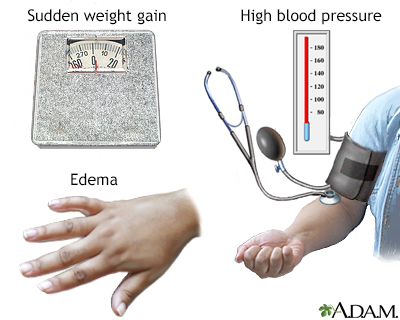Pregnancy SmartSiteTM
Pregnancy - eclampsia; Preeclampsia - eclampsia; High blood pressure - eclampsia; Seizure - eclampsia; Hypertension - eclampsia DefinitionEclampsia is the new onset of seizures or coma in a pregnant woman with preeclampsia. These seizures are not related to an existing brain condition. CausesThe exact cause of eclampsia is not known. Factors that may play a role include:
Eclampsia follows a condition called preeclampsia. This is a complication of pregnancy in which a woman has high blood pressure and other findings. Most women with preeclampsia do not go on to have eclampsia (seizures). It is hard to predict which women will. Women at high risk of seizures often have severe preeclampsia with findings such as:
Your chances of getting preeclampsia increase when:
SymptomsSymptoms of eclampsia include:
Most women will have these symptoms of preeclampsia before the seizure:
Exams and TestsThe health care provider will do a physical exam to look for causes of seizures. Your blood pressure and breathing rate will be checked regularly. Blood and urine tests may be done to check:
TreatmentThe main treatment to prevent severe preeclampsia from progressing to eclampsia is giving birth to the baby. Letting the pregnancy go on can be dangerous for you and the baby. You may be given medicine to prevent seizures. These medicines are called anticonvulsants. Your provider may give you medicine to lower high blood pressure. If your blood pressure stays high, delivery may be needed, even if it is before the baby is due. Possible ComplicationsWomen with eclampsia or preeclampsia have a higher risk for:
When to Contact a Medical ProfessionalContact your provider or go to the emergency room if you have any symptoms of eclampsia or preeclampsia. Emergency symptoms include seizures or decreased alertness. Seek medical care right away if you have any of the following:
PreventionGetting medical care during your entire pregnancy is important in preventing complications. This allows problems such as preeclampsia to be detected and treated early. Getting treatment for preeclampsia may prevent eclampsia. ReferencesAmerican College of Obstetricians and Gynecologists; Task Force on Hypertension in Pregnancy. Hypertension in pregnancy. Report of the American College of Obstetricians and Gynecologists' Task Force on Hypertension in Pregnancy. Obstet Gynecol. 2013;122(5):1122-1131. PMID: 24150027 pubmed.ncbi.nlm.nih.gov/24150027/. Harper LM, Tita A, Karumanchi SA. Pregnancy-related hypertension. In: Lockwood CJ, Copel JA, Dugoff L, eds. Creasy and Resnik's Maternal-Fetal Medicine: Principles and Practice. 9th ed. Philadelphia, PA: Elsevier; 2023:chap 45. Henn MC, Lall MD. Complications of pregnancy. In: Walls RM, eds. Rosen's Emergency Medicine: Concepts and Clinical Practice. 10th ed. Philadelphia, PA: Elsevier; 2023:chap 173. Sibai BM. Preeclampsia and hypertensive disorders. In: Landon MB, Galan HL, Jauniaux ERM, et al, eds. Gabbe's Obstetrics: Normal and Problem Pregnancies. 8th ed. Philadelphia, PA: Elsevier; 2021:chap 38. | |
| |
Review Date: 3/31/2024 Reviewed By: LaQuita Martinez, MD, Department of Obstetrics and Gynecology, Emory Johns Creek Hospital, Alpharetta, GA. Also reviewed by David C. Dugdale, MD, Medical Director, Brenda Conaway, Editorial Director, and the A.D.A.M. Editorial team. The information provided herein should not be used during any medical emergency or for the diagnosis or treatment of any medical condition. A licensed medical professional should be consulted for diagnosis and treatment of any and all medical conditions. Links to other sites are provided for information only -- they do not constitute endorsements of those other sites. No warranty of any kind, either expressed or implied, is made as to the accuracy, reliability, timeliness, or correctness of any translations made by a third-party service of the information provided herein into any other language. © 1997- A.D.A.M., a business unit of Ebix, Inc. Any duplication or distribution of the information contained herein is strictly prohibited. | |

 Preeclampsia
Preeclampsia
